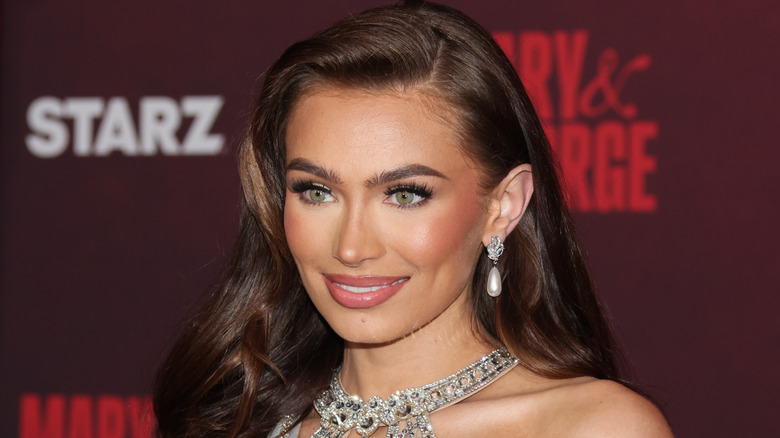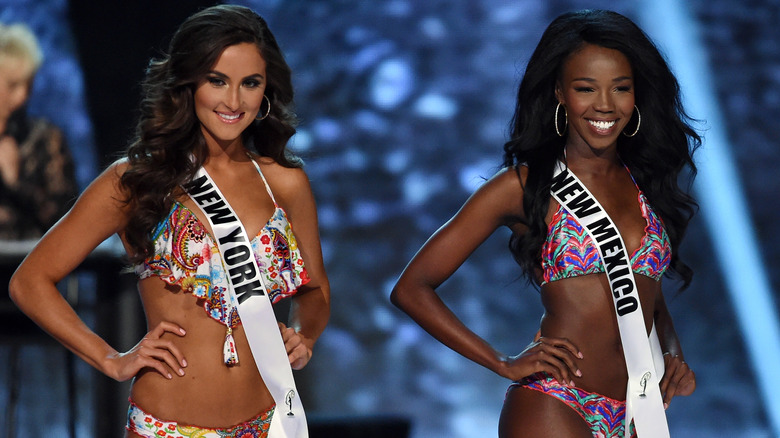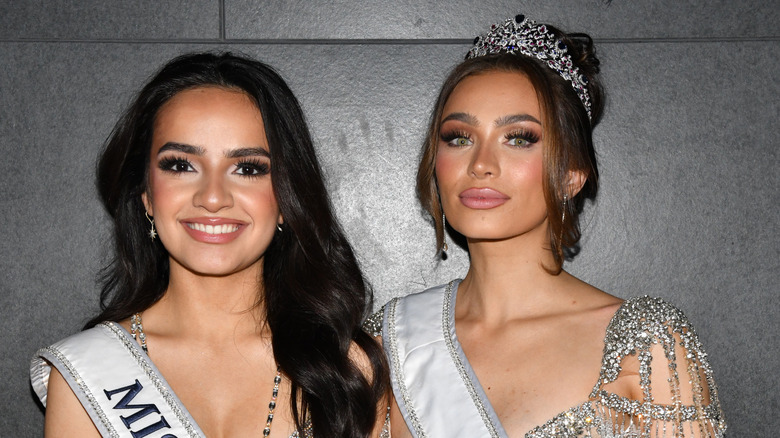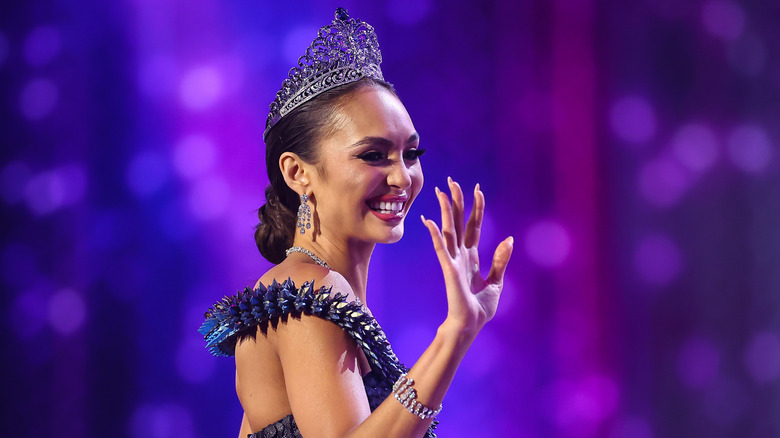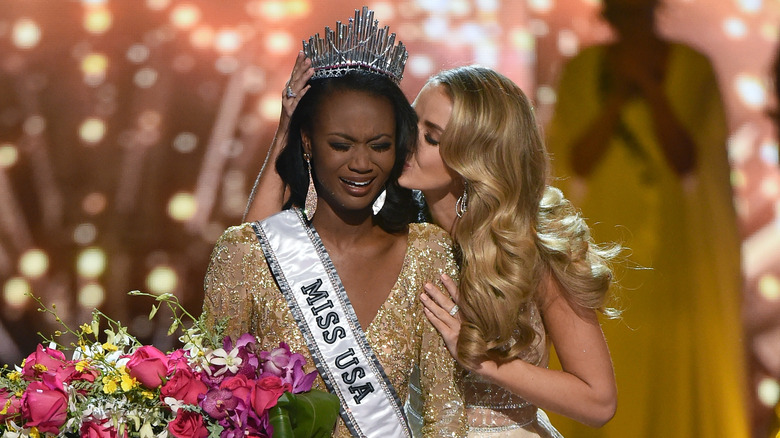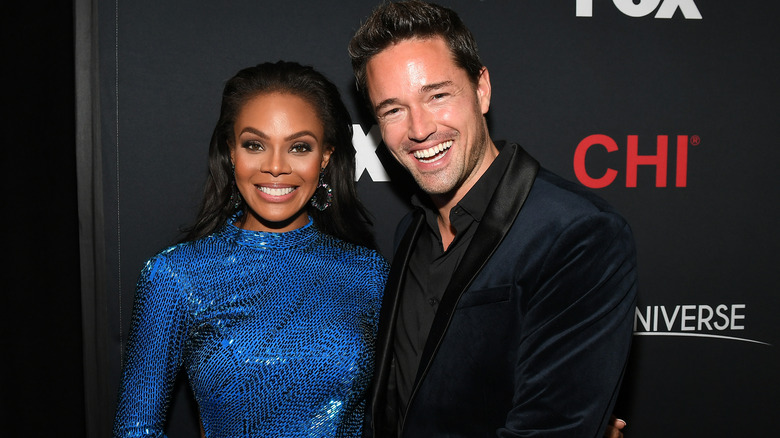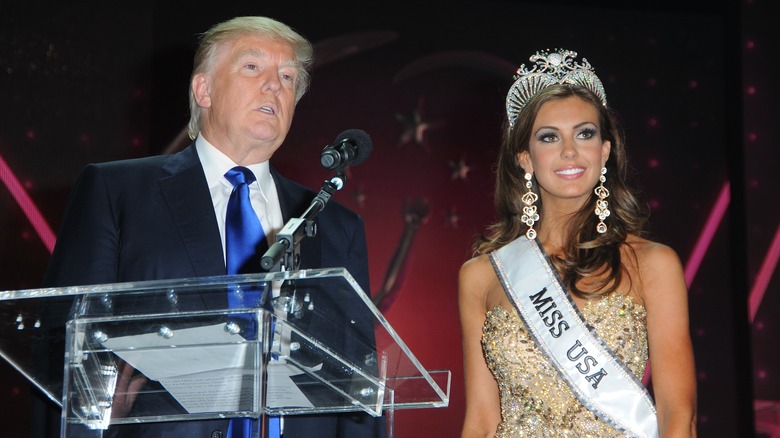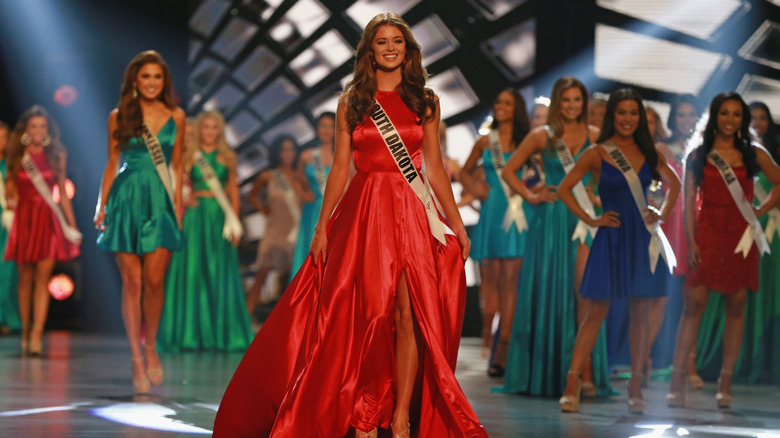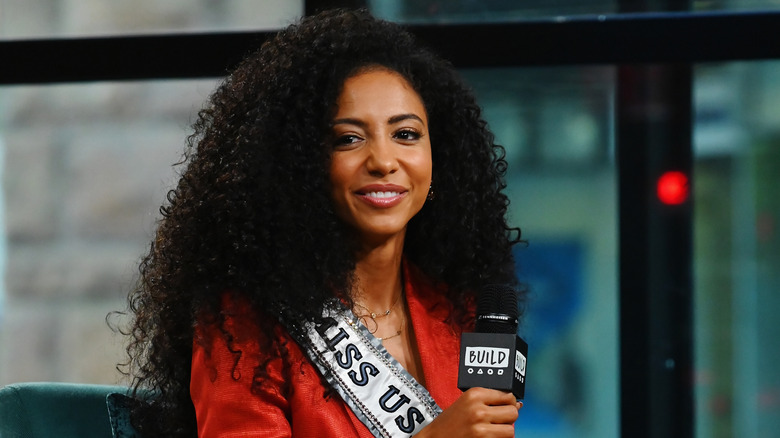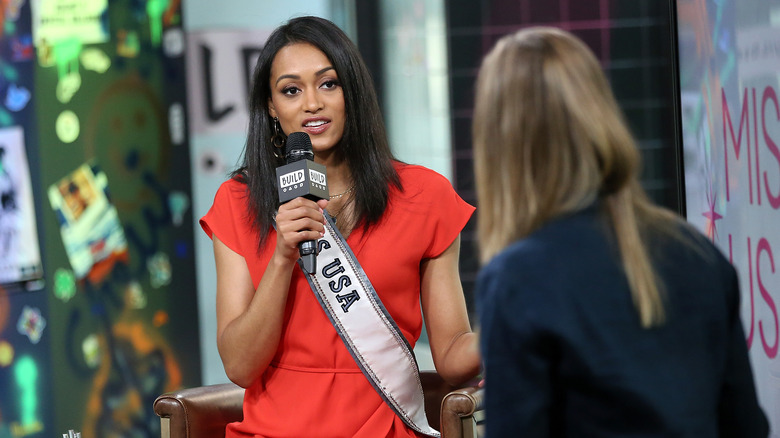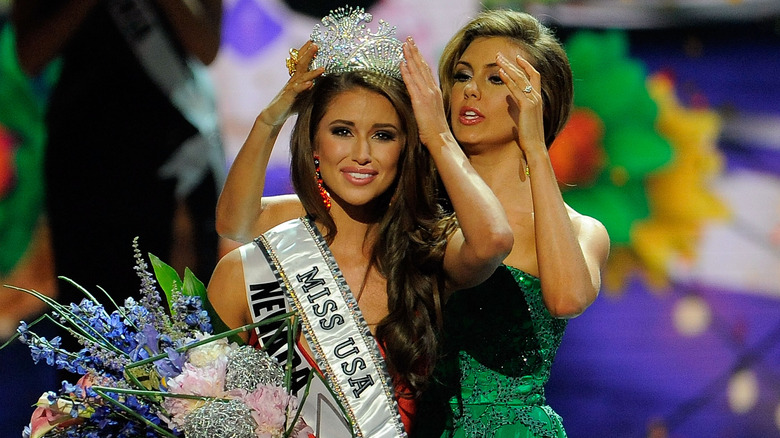The Controversial History Surrounding Miss USA
Noelia Voigt's abdication of her crown in 2024 opened a can of worms at Miss USA. The 2023 titleholder — along with two others from the pageant parent company Miss Universe Organization — resigned from her coveted post eight months into her tenure, stating that she had to prioritize her mental health. "I realize this may come as a large shock to many," the model wrote on Instagram, sharing a statement that has caused a massive shake-up of the organization that is currently engulfed in allegations of workplace bullying, mismanagement, and unethical policies.
While Voigt is yet to speak publicly and in full about what transpired behind-the-scenes after she was crowned Miss USA, social media users are convinced the model has sent a silent message through her viral statement, which spells out "I am silenced" in cryptic code. Her fellow contestants from the 2023 pageant have jointly called for the organization "to release Noelia from the confidentiality NDA clause of her contract, in perpetuity, so that she is free to speak on her experiences and time as Miss USA."
While this push for transparency is a welcome one and could potentially usher in a new era of fairness at beauty pageants, Miss USA participants have been highlighting issues that plagued the organization for years. Throughout its scandal-ridden 72-year existence, Miss USA has come under scrutiny several times over for the culture it has condoned both internally and externally. Take a look at the controversial history surrounding Miss USA.
Like other pageants, Miss USA is accused of being regressive by many
The 21st-century conversation on feminism, empowerment, and inclusivity has brought into question the relevance of beauty pageants in an increasingly progressive world. Despite competitions like Miss USA taking a stance on "being more than just a pageant," recent controversies have done little to inspire confidence in these platforms' abilities to effect positive change. The organization has grappled for years with charges relating to the mistreatment of models — ranging from harassment to mental-health neglect, and rigging — besides being denounced by critics for promoting harmful beauty standards.
Though it positions itself as a broad-minded entity that considers women beyond their looks, past contestants like Heather Lee O'Keefe have disputed this perspective citing the pageant's introduction of newer appearance-based segments in 2022. "It's so much more than that, and I think the organization really backtracked with bringing this new First Impression round into the competition," O'Keefe said (via NBC News). While O'Keefe's claims were challenged by the organization's leadership, the model only reiterated what anti-pageant commentators have been saying for years.
Backstage, the situation is much worse, with models being pitted against each other in allegedly fixed races to the crown. "The idea that pageant contestants are catty, competitive, and out to get each other feeds into a big stereotype in the industry," sociologist Hilary Levey Friedman observed (per The Washington Post), calling for greater transparency at the Miss Universe Organization that has a "historical reputation" for favoritism.
The pageant is charged with breeding a toxic work environment
Following three back-to-back resignations — all of which alluded to inadequacy on part of the organization — Miss USA is under scrutiny for allegedly allowing a culture of toxicity, harassment, neglect, and bullying to breed. Miss USA's social media director Claudia Michelle was the first to step down, making a slew of allegations about the organization's mistreatment of Miss USA and Miss Teen USA winners Noelia Voigt and UmaSofia Srivastava. "I feel the way current management speaks about their titleholders is unprofessional and inappropriate," Michelle wrote on Instagram, claiming that Voigt's mental health had declined and Srivastava was disrespected. The two models followed suit with their resignations, making cryptic public statements that have raised questions about the organization's ethical conduct.
The New York Post, which confirmed that Michelle, Voigt, and Srivastava's resignations were timed to coincide, quoted an insider source as saying, "This toxic atmosphere is a serious concern. There is an urgent need for intervention at the leadership level." Miss USA CEO Laylah Rose has taken one of the hardest hits amid the controversy, with Voigt leveling concerning charges against her — including one that accuses Rose of overlooking a sexual harassment complaint she made. "Every statement you have ever put out about MUO's morals and integrity directly contradicts what is happening within the USA organization," Voigt wrote in her resignation letter obtained by NBC News. Rose in a statement said she was taking these allegations seriously.
There have long been allegations that the competition is rigged
In 2022, the Miss USA pageant found itself in the middle of a firestorm that put its credibility at stake. R'Bonney Gabriel's win — that warranted celebration on account of the first Filipino-American model receiving such recognition — sparked allegations that the beauty contest was rigged. Contestants like Ashley Ehrhart and Heather Lee O'Keefe took to social media to suggest that Gabriel's win had been influenced by favoritism on part of the organization, which was then run by Crystle Stewart's company The Miss Brand.
Gabriel and Stewart shared a connection as Miss Texas USA titleholders. Many cited this as the reason behind Gabriel allegedly receiving exemptions from the contest's rules and even more sponsorship from the organization — charges she denied. "I didn't have an unfair advantage or knew that I was going to win. I worked very, very hard to get to where I am now," Gabriel told ABC News. The controversy prompted an investigation by Miss Universe Organization, which revoked Stewart's leadership.
Charges of contest fixing against Miss USA have persisted for years, especially during the era that Donald Trump reigned over it. After getting wind of the competition allegedly being rigged, 2012 pageant participant Sheena Monnin took the organization head-on by calling it "fraudulent, lacking in morals, inconsistent, and in many ways trashy," and relinquishing her Miss Pennsylvania USA crown (via The Guardian). She was sued by Trump for $5 million.
It hasn't always been the most inclusive space for women of color
Over the last few years, Miss USA has made a significant bid for diversity at its beauty competitions. The crown has rested on the heads of women from varied backgrounds and ethnicities. In fact, in a history-making record, four Black women — Cheslie Kryst, Nia Imani Franklin, Kaliegh Garris, and Zozibini Tunzi — together reigned over major beauty titles in 2019 with their respective wins at the Miss USA, Miss America, Miss Teen USA, and Miss Universe competitions. Needless to say, it took some time for this kind of inclusivity to come into effect in the pageant world that has for the longest time been dominated by limited representations of beauty "centered on whiteness," per The Washington Post.
Miss America was heavily disputed for the misogynistic narratives it created around women and beauty, and became a significant target for the feminist movement in the late 1960s. That said, other pageants were no more open-minded. It took a decade after the first Miss USA contest in 1952 for a woman of color to win the title. Asian-American model Macel Wilson opened the tally in 1962 but her win didn't bring much change for the next 40 years at the pageant, which continued to be overshadowed by white women. Only in 1990 did Miss USA get its first African-American titleholder, with Carole Gist pioneering a new era of diversity for the competition.
Participants have come forward with claims of sexual harassment
Noelia Voigt's claims of inaction against Miss USA's management over the sexual misconduct complaint she raised is hardly the first such grievance of its kind. In 2022 — when the pageant was in the eye of a rigging storm — disturbing allegations surfaced against ex-Miss USA Vice President Max Sebrechts, whom several models accused of impropriety. He was said to have "hit on" at least eight women, with the New York Post publishing screenshots of the sexually charged messages he sent contestants. The FX-New York Times documentary "How to Fix a Pageant" contained a first-hand account from model Taylor Hale who was part of the 2021 pageant and said of Sebrechts, "He whispered in my ear and said, 'You're so gorgeous,' and he kissed my cheek, but it was really the corner of my mouth."
Contestants had reportedly raised complaints against Sebrechts before any action was taken. Miss Wyoming, Mackenzie Kern, said the highest levels of management, including ex-president of the Miss Universe Organization Paula Shugart, were approached but to no avail. "A lot of it was just disregarded," Kern told the Post. "We were reaching out to people, we were reaching out for directors, and it was all brushed under the rug." Sebrechts, who is married to ex-Miss USA Director Crystle Stewart and had been associated with the organization since 2008, was removed from his executive post in 2022 after the company said it was "made aware of the allegations."
Contestants had little agency during Trump's association with the pageant
Wherever Donald Trump goes, controversy follows. One can only imagine what that meant for the already tumultuous world of beauty pageants when Trump took co-ownership of the Miss Universe Organization in 1996 — and by extension, Miss USA. The former United States President, with his notoriously loose tongue, reportedly reigned supreme across various aspects of the beauty pageant — right from the competition results to access into models' dressing rooms. Multiple participants attested to the latter, with 2001 contender Tasha Dixon most notably recounting an incident where Trump walked in on girls changing. "He just came strolling right in. There was no second to put a robe on or any sort of clothing or anything," Dixon told CBS News.
According to Dixon, there was little scope for redressal of complaints since Trump was the final authority on everything. He flaunted his control in so many words to radio shock-jock Howard Stern in 2005. "You know they're standing there with no clothes ... And so I sort of get away with things like that." Like in most operations at the organization, he also had a say in which "Trump cards" would be given an extra push toward the crown, with Miss Universe judge Jeff Lee revealing to GQ the politician had a hand in selecting up to six semifinalists, at least. Trump sold the organization in 2015 after his incendiary remarks against Mexican immigrants created a mass pushback among stakeholders.
It's been linked to a rise in body-image issues among women
Beauty pageants have long been put on trial for validating and shaping skewed female beauty standards that have far-reaching effects on the public consciousness — in particular, on young girls and women. In 2023, a joint study by professors from the University of Massachusetts Amherst and the Vanderbilt University more than corroborated these notions. By using data from the Centers for Disease Control and Prevention (CDC), the paper determined that since the 1990s, beauty competitions like Miss USA had been shaping the health behaviors of women in the states where pageant winners were from.
"Perhaps unsurprisingly, while there have been Black, Latina, Asian, Muslim, and deaf pageant winners, there has never been a winner who was plus-size during the competition," the paper read, examining the widespread body-image issues and weight-loss efforts that pageants triggered among women. "We need to be a little more aware of how media is shaping our views of ourselves, our views of other people and our views of what is and what is not acceptable — be it health behaviors or otherwise," researcher Brandyn Churchill said (via UMass).
While the whole foundation of beauty pageants rests on appearances, some contests like Miss America have attempted to redefine the narrative by scrapping swimsuit rounds and introducing talent rounds. Miss USA, which falls under the Miss Universe Organization, also claims it is "not just about outer beauty."
The pageant has taken a mental toll on many winners
Noelia Voigt's abdication from her reigning status as Miss USA 2023 has blown open the mental-health conversation that has hung low over the pageant for years. Even as she spoke about "achieving a lifelong dream" through the pageantry platform, her viral statement stressed on the importance of prioritizing mental health. "The fact that I've been able to kind of shed a light on that and be someone that people can look up to in that sense — and let people know that if something isn't good for you, it's okay to step away from it," Voigt told People.
While Voigt hasn't publicly acknowledged them, her resignation letter to Miss USA details allegations of toxic workplace behavior that regarded very little for her well-being. The charges spotlight CEO Laylah Rose, whom Voigt has accused of aggression, derogatory remarks, and harassment, according to NBC News. The model wrote that she was taking medications for anxiety "due to consistently being on edge, worrying about what Laylah will pop up with."
This is not the first time a model has spoken about the mental pressure that comes with the Miss USA platform. 2019 winner Cheslie Kryst — who died in 2022 after struggling with depression — wrote in her memoir "By the Time You Read This" about how the attention that came her way brought with it the burden of online death threats, insecurities, and imposter syndrome.
If you or someone you know is struggling or in crisis, help is available. Call or text 988 or chat 988lifeline.org
Several contestants have made problematic public statements
Despite the cosmetic cover-ups and glam shows that lend it the image of perfection, the Miss USA pageant is not immune to the flubs made by its contestants. Every once in a while, the organization finds itself in hot water over controversial statements made by the models it has platformed and the consequences that follow. One of the most notable instances occurred in 2009, when Carrie Prejean — a top contender for the crown — used the Miss USA stage to publicize her belief that marriage should be between a man and a woman. Prejean's answer invited heavy criticism from advocates of LGBTQIA+ marriage, and she was eventually stripped of her Miss California USA title. While pageant executives claimed she was fired "based solely on contract violations," per ABC News, Prejean insisted that it was the price she paid for airing her opinions.
Meanwhile, 2017 pageant winner Kara McCullough was subjected to backlash after an answer she gave during the competition about healthcare being a privilege, not a right, sparked debate. "As a government employee, I'm granted healthcare and I see first-hand that for one to have healthcare, you need to have jobs," the scientist-model famously said (via the BBC), later clarifying her controversial stance in interviews. Miss USA 2018 Sarah Rose Summers also had to apologize for certain remarks she made on Instagram about the English-speaking skills of her fellow Miss Universe contestants from Vietnam and Cambodia, which many deemed racist.
The eligibility of some pageant winners has been questioned
Miss USA has, more than once, run into dispute over the eligibility of its winning participants. Controversy erupted in 2014 when Nia Sanchez, a California-born model, competed in the national pageant from Nevada after failing to win from her home state three years in a row. Sanchez had been living in Nevada since 2012, allegedly only fulfilling the pageant's minimum residency requirement.
While Sanchez swatted away rumors of a fake residency — as did the Miss Universe Organization — claims of carpetbagging continued to persist, especially after a clip went viral of the model failing to name the capital of Nevada. Allegations pinpointed Miss Nevada executive director Shanna Moakler's role in the scandal, with a source telling Fox News "she personally coached Nia on what she needed to do to qualify in Nevada and skirt around the need to be actually from there."
Another disputed pageant entry dates back to 1957, when just hours after Leona Gage became Miss USA, a string of revelations were made: Gage was 18, not 21 as she had previously declared, and she had been married since she was 14 and had two children. Desperate for money and an escape from domestic pressures, she had entered the coveted contest. Her pageant glory lasted for a day and her crown was passed on to runner-up Charlotte Sheffield. Gage told The Baltimore Sun her modeling agency knew about her marital status but proceeded with her application anyway.
